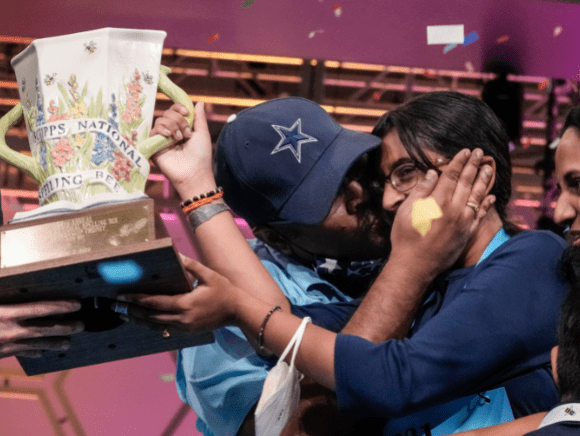Just when Americans are convinced the future of this great nation will be condemned to participation trophies and basement-dwelling slackers, 14-year-old Harini Logan comes on the scene to prove there is still hope for the American Dream. The teenager from San Antonio, TX, wowed the audience – in person and on TV – at the Scripps National Spelling Bee, winning the competition after a historic first-of-its-kind “Spell Off.”
Holding a well-deserved trophy and a check for $50,000, Logan took it in stride, saying, “Just so surreal, it’s my fourth time at the Bee. This is such a dream.”
Grace Under Pressure
It all came down to a seven-letter word for a little aquatic bird: moorhen. The two still standing headed into a lightning round. The Spell Off was called for. Twelve-year-old Vikram Raju and Logan were given the same exact words to spell in 90 seconds for the win. Raju claimed 15 of 26 correctly to Logans 22 accurate spellings.
[substack align=”right”]Both Logan and Raju demonstrated Zen-like control under the pressure of the tiebreaker. As Logan told newscasters the next day, “It was really just getting into that mindset where I could have that, just calmness, where I could focus on the words rather than getting stressed out.” Well, it worked for the teen who gave most of the credit to her mom for being her spelling trainer, “my mom is sort of my coach,” Logan told Good Morning America the next day. “It takes a lot of commitment … and, of course, a passion for the spelling bee.”
There were a few contestants appearing nervous and overwhelmed – or without Zen: Annie-Lois Acheampong, from Ghana, ran off the stage during elimination rounds claiming she had “to pee.”
The Scripps Bee – Work and Dedication
The National Spelling Bee is the longest-running and most prestigious educational competition in the nation. Launched in 1925, the Bee hosts hundreds of kids from all over the United States – with a few other countries represented – in Washington, D.C. It is a long road for kids and parents who make it to the finals, sacrificing free time and other activities and replacing that time with an intense study of words. In some cases, Bee participants have admitted they attempted to memorize every word in a 3,000-page dictionary.
A former Bee contestant in 1996, Rebecca Sealfon, writes that the annual event is an “American spectacle in which our competitive spirit encounters the idiosyncrasies of the English language.” Sealfon might still be obsessed with the Bee and has done her research on the history:
“The American obsession may have started with the Puritans, who emphasized the power of precisely written biblical phrases. By the mid-18th century, spelling competitions were common; Benjamin Franklin recommended their use in a 1750 proposal for a school. Recreational spelling challenges were fashionable in the 19th century for both adults and children. The Hoosier Schoolmaster, a best-selling novel in 1871, includes a hero who falls in love with a woman he is facing in a ‘spelling match,’ and Mark Twain mentions ‘spelling fights’ in The Adventures of Tom Sawyer.”
It’s hard to argue with Sealfon’s statement of a nation that marks success at times with mastery of the English language.
 Tweaking Tradition
Tweaking Tradition
Post pandemic, the Bee is gaining strength again. In 2019 there were 562 contestants. In 2020 the Bee was canceled. In 2021, there were only 209 challengers and a few alterations: Scripps added the “word meaning” and the “spell-off” to test the mettle of the finalists.
This year the Bee gained momentum, with 234 contestants, with 12 making it to the finals. And ESPN, the network that has televised the Bee for almost 30 years, was replaced by ION and Bounce.
But Americans are still excited to watch the Bee, and the new host, actor LeVar Burton, was amongst those eager to be involved. He said he was “honored” to be a part of the event and stated: “Like a lot of folks, I look forward to the competition every year and am excited to be a part of this wonderful tradition that celebrates excellence.” There is still hope for the future.




